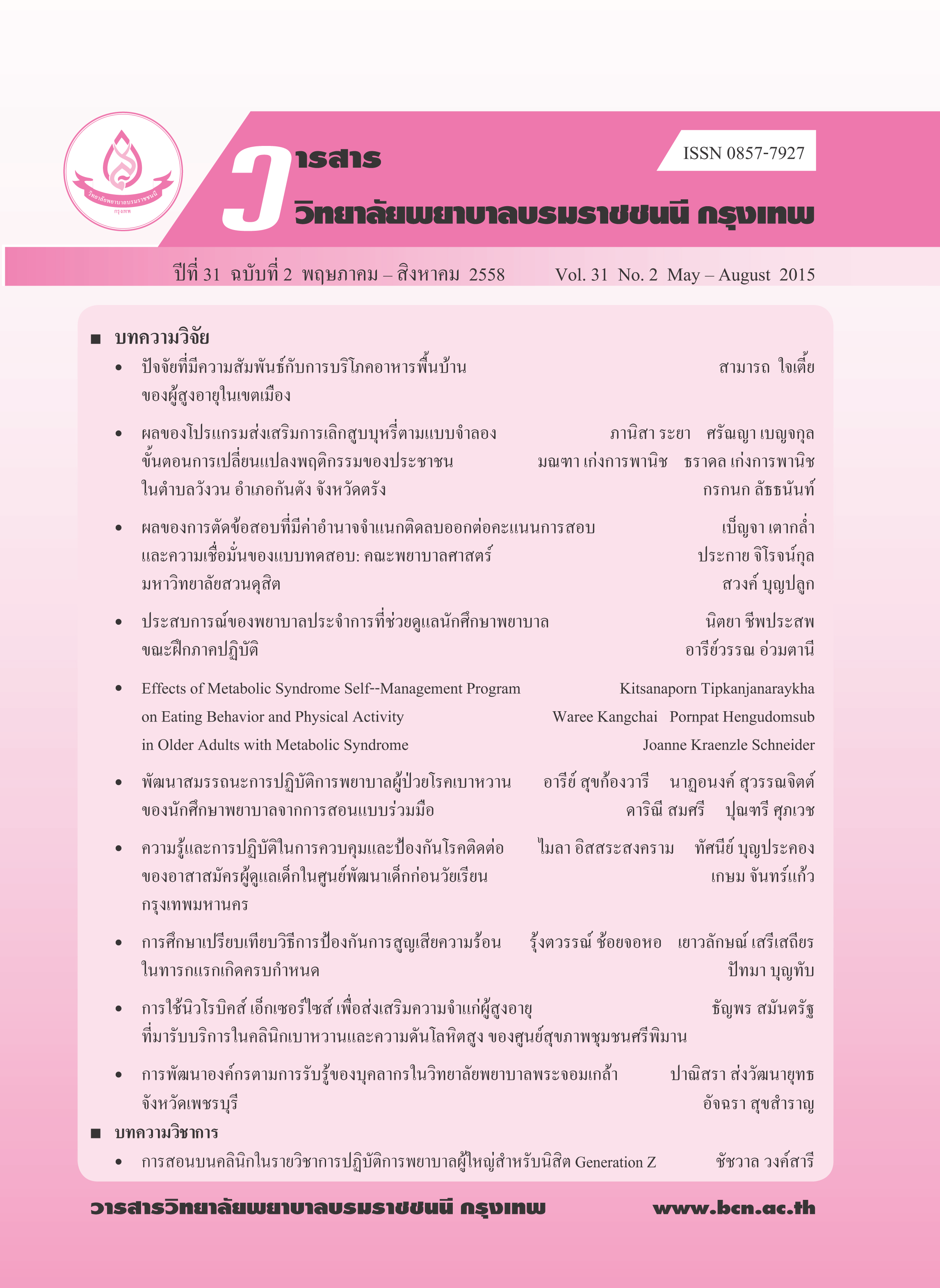การพัฒนาการปรับตัวด้านบทบาทหน้าที่ต่อตนเองและครอบครัว ของผู้ป่วยเอดส์โดยการให้คำปรึกษาครอบครัว DEVELOPMENT OF ROLE ADAPTATION TOWARDS SELF AND FAMILY OF PATIENTS WITH AIDS THROUGH FAMILY COUNSELING
คำสำคัญ:
การปรับตัวด้านบทบาทหน้าที่ต่อตนเองและครอบครัว, ผู้ป่วยเอดส์, การให้คำปรึกษาครอบครัว, self – family adaptation role, AIDS, family counselingบทคัดย่อ
บทคัดย่อ
การวิจัยครั้งนี้มีวัตถุประสงค์ 1) ศึกษาองค์ประกอบการปรับตัวด้านบทบาทหน้าที่ต่อตนเองและครอบครัวของผู้ป่วยเอดส์ และ 2) ศึกษาผล ของการพัฒนาการปรับตัวด้านบทบาทหน้าที่ต่อตนเองและ ครอบครัวของผู้ป่วยเอดส์ โดยการให้คำปรึกษา ครอบครัวกลุ่มตัวอย่าง ส่วนที่ 1 ผู้ป่วยเอดส์ จำนวน 1,100 คน เครื่องมือที่ใช้คือ แบบสอบถามการปรับตัว ด้านบทบาทหน้าที่ต่อตนเอง และครอบครัว ส่วนที่ 2 ผู้ป่วย เอดส์ที่มีคะแนน แบบสอบถามการปรับตัวด้าน บทบาทหน้าที่ต่อตนเองและครอบครัวต่ำกว่าเกณฑ์ จำนวน 10 ครอบครัว กลุ่มทดลอง จำนวน 5 ครอบครัว และกลุ่มควบคุม จำนวน 5 ครอบครัว สถิติที่ใช้ในการวิเคราะห์ ข้อมูลคือ 1) สถิติเชิงพรรณนา 2) วิเคราะห์องค์ประกอบเชิงยืนยัน (A Confirmatory Factory Analysis) และ3) สถิติที (t-test)
ผลการวิจัยพบว่า 1) โมเดลการวิเคราะห์องค์ประกอบเชิงยืนยันการปรับตัวด้านบทบาทหน้าที่ต่อ ตนเองและครอบครัว 9 องค์ประกอบ ได้แก่การรับประทานอาหารการออกกำลังกาย การรับประทานยาต้านไวรัสเอดส์ การคลายเครียด การงดเว้นสิ่งเสพติด การป้องกันการติดเชื้อเพิ่ม การทำงานเลี้ยงครอบครัว การดูแลสมาชิก ในครอบครัว และการปฏิบัติตนต่อคู่สมรส ซึ่งมีความสอดคล้องกับ ข้อมูลเชิงประจักษ์และ มีน้ำหนัก องค์ประกอบมาตรฐานอยู่ในเกณฑ์สูงอย่างมีนัยสาคัญทางสถิติที่ระดับ .05 (มีค่าเท่ากับ 117.02) และ 2) กลุ่มทดลองที่ได้รับการให้คำปรึกษาครอบครัวมีค่าคะแนนเฉลี่ยการปรับตัวด้านบทบาทหน้าที่ต่อตนเอง และครอบครัวโดยรวมและรายองค์ประกอบสูงกว่ากลุ่มควบคุมอย่างมีนัยสาคัญทางสถิติที่ระดับ .05
Abstract
The purposes of this research were: (1) to explore the components of role adaptation towards self and family in patients with AIDS and (2) to evaluate the effects of family counseling on development of role adaptation towards self and family in patients with AIDS. The samples for the objective 1 consisted of 1,100 patients with AIDS. The samples for the objective 2 consisted of 10 family and patients with AIDS and having low role adaptation scores. They were divided into the family counseling experimental and control groups for five each. Statistical analytic procedures included: 1) Descriptive statistic, 2) Confirmatory factor analysis significantly verified the model fit of role adaptation construct, and t-test.
Finding revealed that: 1) nine factors of role adaptation towards self and family in patients with AIDS including: diet, exercise, taking antiretroviral drug, stress reduction, substance use, infection prevention, working , taking care family member, and practice towards partner. These factors were congruent with empirical data with high model fit ( = 117.02, p < .5). 2) The family counseling experimental group had higher mean score of role adaptation towards self and family than the control group at the 0.5 level of significance
Downloads
ดาวน์โหลด
เผยแพร่แล้ว
รูปแบบการอ้างอิง
ฉบับ
ประเภทบทความ
สัญญาอนุญาต
บทความที่ได้รับการตีพิมพ์ เป็นลิขสิทธิ์ของวารสารวิจัยสุขภาพและการพยาบาล (วิทยาลัยพยาบาลบรมราชชนนี กรุงเทพ) ไม่สามารถนำไปตีพิมพ์ซ้ำในวารสารฉบับอื่น


















